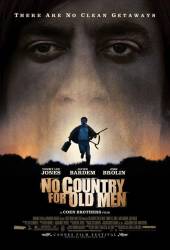Factual error: When Chigurh is in the gas station and throws the wrapper on the counter, the "Nutrition Facts" are visible on the label. Set in 1980, the "Nutrition Facts" label wouldn't have been available for at least another fourteen years, as nutrition labels were started in 1994.

No Country For Old Men (2007)
2 reviews
Directed by: Joel Coen, Ethan Coen
Starring: Woody Harrelson, Tommy Lee Jones, Josh Brolin, Javier Bardem
Your rating
Average rating
(11 votes)
Too many errors to be rated high although this was a very entertaining movie.
10/10.One of the best crime noir movies ever made.I would say it easily belongs in the top 20. Tommy Lee Jones gives his best performance ever here, with enthusiasm.Javier Bardem's Anton Chigurth is easily one of the best movie villains ever.He displays the casual way of going about and killing people.It leads to the question of whether or not he truly likes doing it or sees it merely as a job.The unforgiving countryside of Texas makes for a perfect atmospshere as Josh Brolin flees with ill gotten gains.The scene that stuck out the most for me was him speaking with a gas station owner.The way he flips the coin while saying"Everything.You stand to win everything.You been putting it up your whole life, you just didn't know it."I found that chilling.If you like crime noir movies then you'll enjoy No Country For Old Men which shows the evolving ways of the criminal mind.
Nervous Accountant: Are you going to shoot me?
Anton Chigurh: That depends. Do you see me?
Question: The movie does not have a soundtrack at all, yet during the end credits, music is heard. What is the name of that music?
Join the mailing list
Separate from membership, this is to get updates about mistakes in recent releases. Addresses are not passed on to any third party, and are used solely for direct communication from this site. You can unsubscribe at any time.
Check out the mistake & trivia books, on Kindle and in paperback.




Answer: "Blood Trail (end titles)" By Carter Burwell, the Coen's frequent composer. The Film does not have a soundtrack, but you can listen to it in Carter Burwell's website: http://www.carterburwell.com/projects/NCFOM.html.